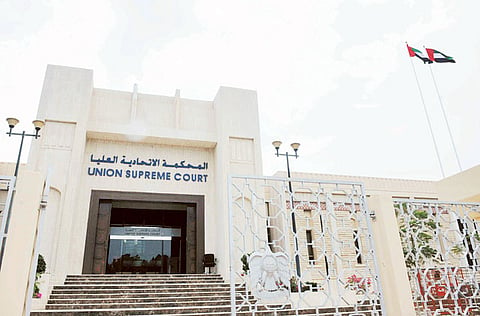'UAE’s justice system guarantees transparency'
Legal system is in line with international laws, says minister on eve of historic verdict

Abu Dhabi: The State Security Court is set to give a ruling on Tuesday in the biggest court hearing in the UAE’s history, legal sources said.
The verdict will be final and may not be appealed, the sources said.
The magnitude of the “sedition trial” is reflected in the fact that for the first time in the country’s history a group of 94 Emiratis are on trial for belonging to an illegal organisation and plotting to overthrow the government, the sources explained.
The trial, which began in March, is part of a crackdown on sedition and belonging to Egypt’s Muslim Brotherhood.
Last month, the UAE said it would put on trial 30 more Emiratis and Egyptians accused of setting up an illegal branch of the Muslim Brotherhood.
The UAE’s constitution states that justice is the basis of government, which allows fairness, integrity and transparency to be entrenched in the judiciary, said Dr Hadef Al Daheri, Minister of Justice.
“In performing their duties, judges are independent and are influenced only by the rule of law and their own conscience,” Al Daheri said, quoting the country’s constitution.
Al Daheri was speaking to Gulf News on the eve of the verdict.
The case, being held in the State Security Court at the Federal Supreme Court in Abu Dhabi, will ultimately decide the fate of the alleged members of the Al Islah organisation, which is affiliated with the Egypt-based Muslim Brotherhood.
Al Daheri said the legal system of the UAE is in line with international laws that lead to the achievement of justice and the rule of law.
The minister said the UAE’s justice system leads the Middle East and North Africa in the rule of law according to the World Justice Project’s Rule of Law Index 2012-2013, which testifies to the great progress attained by the country’s criminal justice system.
Countries are judged by the non-profit group World Justice Project (WJP) on eight factors: fundamental rights, limits on government powers in the legal system, the absence of corruption, order and security, open government, regulatory enforcement, access to civil justice and effective criminal justice.
In all of these areas the UAE scored more highly than the other six Middle Eastern and North African countries studied – Egypt, Iran, Jordan, Lebanon, Morocco and Tunisia.
The index said the UAE is safe from crime and violence (ranking fifth in the world) and the civil court system is efficient and relatively independent. “Public institutions in the country are relatively well developed and free of corruption (ranking twenty-third globally), and government officers are held accountable for misconduct,” the index said.
However, Al Daher said, this is not enough as we aspire to become one of the world’s best countries in the rule of law in line with the UAE’s Vision 2021.
Al Daheri said the country’s legal system ensures that there is fairness across the board for those involved in the legal system, whether defendants, plaintiffs, or others. “The UAE’s justice system ensures that defendants are guaranteed fair trail without any interference by other authorities, respect of their human rights and the right to be presumed innocent until proved guilty.”
The UAE leaders, he said, are committed that laws of the country are on a par with those of advanced countries to secure fairness, transparency and independence.
Sign up for the Daily Briefing
Get the latest news and updates straight to your inbox



